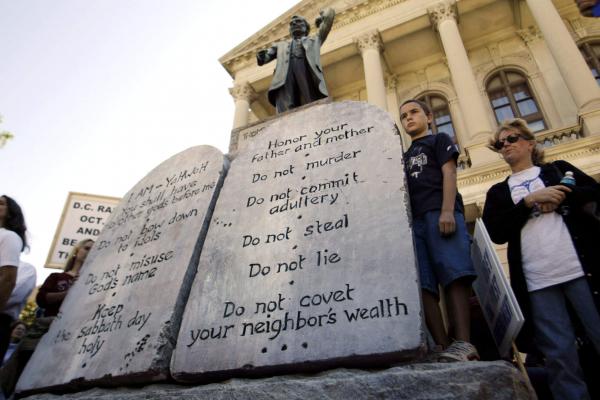The Senate of my home state, Texas, recently made news for passing three bills designed to bring Christianity into public schools. As I told NewsNation when they interviewed me earlier this week about the proposed legislation, I think this is an example of a government attempting to force beliefs on people. Yesterday, the State House failed to pass a law that would’ve required the Ten Commandments to be displayed in public schools. SB 1515 would’ve required that “a public elementary or secondary school shall display in a conspicuous place in each classroom of the school a durable poster or framed copy of the Ten Commandments.”
Republicans in Texas argued that this move would reinforce essential American identity because America was founded on so-called “Judeo-Christian” principles. According to the Texas Tribune, Republican Lt. Gov. Dan Patrick defended the law by saying, “Bringing the Ten Commandments and prayer back to our public schools will enable our students to become better Texans.”
Lawmakers like Republican Gov. Greg Abbott, Patrick, and the senators who initially voted to approve this bill don’t actually want the Ten Commandments to be the law of the land.
What they do want is to weaponize the idea of the Ten Commandments to uphold their version of Christianity. This version of Christianity privileges the powerful at the expense of the vulnerable. They want to use the idea of the Ten Commandments to reinforce their increasingly ideological religiosity. But this is not what God intended when God gave Moses the Ten Commandments (Exodus 20; Deuteronomy 5). As theologian Walter Brueggemann observed in his book Theology of the Old Testament, God’s purpose in giving the Ten Commandments was “to institutionalize the Exodus: to establish perspectives, procedures, policies, and institutions that will generate Exodus-like social relationships.” Although the law has failed, I still think it’s interesting to wonder what would happen if the Ten Commandments were posted by legal mandate in Texas schools and children were encouraged to follow them.
1. I am the Lord your God, who brought you out of the land of Egypt, out of the house of slavery; you shall have no other gods before me.
This first commandment is a declaration of God’s identity: God is not a generic, placeholder deity. This God has a name. That “LORD” there in Hebrew is the divine name YHWH, which means something like, “I am that I am.” And if that’s not enough clarification, God grounds God’s identity in delivering the people of Israel “out of the house of slavery.”
Teachers who would’ve displayed this commandment would’ve run the risk of facing the ire of Texas lawmakers who are working to downplay how the historical reality and ongoing legacy of chattel slavery are being taught in Texas schools. One work group of nine educators from South Texas is going so far as to insist on referring to slavery as “involuntary relocation.” Regardless, it doesn’t make sense for a country built on Christian nationalism and slavery to celebrate a God committed to liberating the oppressed. The God who liberates surely has strong opinions about the American empire, which resembles biblical Egypt in its commitment to exploiting and abusing the vulnerable.
2. You shall not make for yourself an idol.
An idol is an image of a god or multiple gods. It’s a means for the worshiper to focus their worship toward particular imagery. People in the ancient world would offer gifts or even share meals with idols. But YHWH made YHWH’s own image by creating humanity. God’s people knew we become what we worship, so they were careful to avoid reducing God to a statue made of stone or word. God’s presence is not revealed in a list of commandments but in the students, teachers, and faculty of the schools. One might imagine, then, that lawmakers who place such a priority on the Ten Commandments would go out of their way to protect these images of God. But in the face of yet another mass shooting, Abbot refuses to enact even common-sense gun control measures like raising the age to purchase a firearm from 18 to 21. A survey conducted by the University of Texas at Austin found that 76 percent of Texas voters favored raising the age to purchase a firearm.
3. You shall not make wrongful use of the name of the Lord your God.
The third commandment is not about kids saying, “OMG!” One example of a “wrongful” use of the divine name would be attaching God’s name to our own personal causes. Abbott, in rejecting gun control reforms by claiming the right to bear arms is “God-given,” violates this commandment. So, too, does Patrick when he frames the battle for reproductive rights and trans rights in the following way, arguing that “This is a battle of those who believe that they are God and have control over life and death and even their sex, and those who believe there is a Creator, who believe in God, believe in Jesus Christ.”
4. Remember the Sabbath day, and keep it holy.
Surely if keeping the Sabbath holy prohibits work, this includes homework. Work is right in the name. Would this law passing have meant that schools would no longer assign homework over the weekend? Would it have meant that Texas would allow all workers to rest from their jobs for both the Jewish and Christian Sabbaths? Would all work have stopped in Texas starting Friday night and extend until Sunday after church so laborers — including “the alien” — could rest?
5. Honor your father and your mother.
Which parents would kids have to honor? The commandment isn’t qualified. But Abbott recently passed an executive directive to Child Protective Services, mandating that they investigate parents who offer gender-affirming care to their transgender kids. In fact, Texas has become one of the most hostile states in the union for transgender persons and their families. Is this what honoring those parents looks like?
6-8. You shall not murder. You shall not commit adultery. You shall not steal.
These are the ones everyone knows. Murder and theft are already against the law, but Texas legislators can’t seem to keep these commandments. Despite running as a “pro-life” candidate, Abbott is almost gleeful in his approval of capital punishment. He refers to it as “Texas justice” and has overseen 55 executions since taking the governorship. Representative (and former pastor) Bryon Slaton was recently expelled from the House after being caught in adultery with a 19-year-old staffer. And Texas attorney general Ken Paxton still hasn’t faced trial for securities fraud, despite having been indicted seven years ago. If our lawmakers can’t be bothered to keep these commandments, why do they want to post them in our schools?
9. You shall not bear false witness against your neighbor.
Though this commandment usually gets treated as “no lying,” it’s really about maintaining a just court system (hence the “false witness” bit). Our justice system is significantly more expansive than ancient Israel’s. In addition to courts, we now have police — a criminal “justice” institution. Police, through Student Resource Officers (SROs), now have a major presence in many schools — particularly those in BIPOC communities. Research shows that the presence of SROs in schools increases arrests for noncriminal behavior and puts more kids on a trajectory to end up in prison. Such outcomes are clearly unjust and, as such, break this commandment. If Texas politicians ever want to post the Ten Commandments in public schools, then we’ll have to desegregate our schools and address racial bias among SROs, as well as work to dismantle the school-to-prison pipeline.
10. You shall not covet.
The question here is, “How do we legislate this? How does one measure coveting?” This commandment is grounded in the character of YHWH, who the people are meant to see as the source of what they have. This final commandment assumes a beloved community that is working to embody the liberating justice of the Exodus story.
We can’t post this commandment without acknowledging the way the land of Texas was stolen from Indigenous people. In 2021, the West Texas town of Presidio officially returned a burial site to the Lipan Apache. Tribal Administrator Oscar Rodriguez acknowledged the move, saying, “We’re thankful that we’re there because among other things, what it means is a respectful recognition by the local community of the Lipans.”
Not only do we need to acknowledge that the land we are on was stolen, but we need to make reparations for this sin while also educating students about the legacy of settler-colonialism. If our state government is not willing to acknowledge and address these systemic failures, they shouldn’t post these commandments anywhere.
***
Abbott, Patrick, and the rest of the Texas legislators either don’t know the content of the commandments or don’t care. All that matters is that they can use the idea of the commandments to reinforce their version of Christianity on the entire state of Texas. In this, they look more like Pharaoh, who set himself against justice and liberation, than Moses, who made himself YHWH’s agent of liberation.
Got something to say about what you're reading? We value your feedback!






